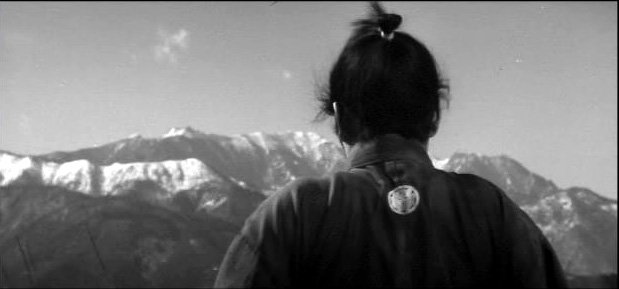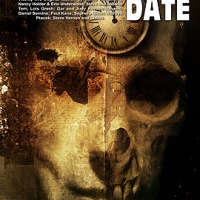Okay. It’s been almost a month since I posted about how I want to write about outsiders. I have to admit that this is SOP around here.
It’s always been easy for me to get excited about an idea and what I could do with it, and yet, not so easy to follow through.
But I’m trying. I submitted another short story last month and have written two more chapters for 2082. I get points for that, eh?
Anyway, in the last 20-some days, I’ve been thinking about what to write in this first outsider post: doing research, gathering info, watching way too many film clips on Youtube.
But enough of that! It’s time to actually write about one of these people and why I think he’s cool.
So, let’s begin at the beginning: the original man with no name. Note: spoilers abound.You’ve been warned.
Toshirō Mifune first created the character of this nameless rōnin in Akira Kurosawa‘s 1961 film, Yojimbo. He played the same character the next year in the sequel, Sanjuro. Eight years later, in 1970, he sort of reprised the role in two non-Kurosawa films, Zatoichi Meets Yojimbo and, finally, The Ambush: Incident at Blood Pass.
In all these films, Mifune plays a masterless samurai, a rōnin, for hire. When we first meet him in Yojimbo, he’s not only masterless; he’s pathless, as well. To decide which direction to turn, he throws a stick in the air and follows where it lands. Right off the bat, we know we’re not dealing with a typical citizen of 19th century Japan where the ruling class strictly defined people’s roles. In both Yojimbo and Sanjuro, our nameless hero sets that rule on its head, which isn’t surprising, really, given that the typical rōnin wasn’t looked upon very highly, seen, at best, as a useful thug-for-hire or, at worst, a murderous criminal.
So, why not mess with people?
In Yojimbo, the path our rōnin chooses leads him to a desperate village. Two rival gangs–one led by Seibei (played by Seizaburō Kawazu), the other by Ushitora (played by Kyu Sazanka)–are fighting for control of the town, and the only person (besides the gang leaders) profiting from the violence is the coffin-maker. The local innkeeper tells Mifune’s character that he ought to leave town, but instead, he decides it might be fun to hang around and see if he can profit from the craziness. He plays the two gang leaders against each other, offering his services as a bodyguard (a yojimbo) to the highest bidder.
Things take an interesting turn when Ushitoro’s younger brother Unosuke (played by Tatsuya Nakadai) returns to the village carrying a revolver.
A gun at a sword fight. We’ve all seen how that worked out in Raiders of the Lost Ark, right?
Yeah, don’t be so sure. But it does complicate things, as does the rōnin’s decision to liberate a young woman who Ushitoro has taken from her husband and child for his own lust. Unosuke has Mifune’s character severely beaten when he figures out that he’s the man responsible, setting up the final battle.
In Sanjuro, our bodyguard travels to a different town where, instead of dealing with peasants and petty criminals, he deals with a group of young samurai and their clan leaders. The samurai are in a tight spot, taking on the corrupt leadership of their clan, but are so wrapped up in their ideas of how the world should work, that they don’t see how it actually does work. The cynical rōnin, however, knows better and volunteers to help rescue one of the young men’s uncle who’s been framed and imprisoned by a corrupt superintendent.
Maybe not so cynical.
Sanjuro is a more comedic film than Yojimbo since the young samurai who Mifune’s character finds himself with are quite naïve, even buffoonish at times. They’re easily fooled by appearances, assuming, for instance, that this stranger among them can’t be that great of a guy because he’s rude and odd and doesn’t act like they think a samurai should. Most of them slowly come around as he repeatedly prevents their stupidity from being their end. Needless to say, Mifune’s character is quite often annoyed with these fools.
Outsider, yes or no?
Most decidedly yes. He wouldn’t be at the top of my list otherwise. But why is he one?
We never learn the bodyguard’s backstory. I assume that, at one point in his life, he was very much an insider, having been, most likely, born into the samurai class, one of the highest ranking classes in Japan at the time. But then, something happened that is never spoken about. The bodyguard loses his master, thus losing his position in society. He becomes a wanderer—a sword for hire, creating fictional names when asked to identify himself. In both Yojimbo and Sanjuro, he chooses his name by looking out the window. In the first film, he sees a mulberry field (Kuwabatake); in the latter, camellias (Tsubaki). Sanjuro (the word he picks for his first name) means thirty-year old, although he jokes in both films that he’s closer to 40. People raise their eyebrows at these names, but no one challenges him.
With his cynical nature, cranky temper, and dry sense of humor—as well as the common assumption that he’s nothing but a hired killer (an assumption he doesn’t choose to correct)—he frightens people, so he’s not welcomed anywhere with open arms. It doesn’t help that he rarely has any money.
So: poor, hard to get along with, intimidating, vagabond, exiled to the edges of society. Sounds like an outsider to me.
So, this guy’s a hero?
It seems that way to me. Even though he no longer enjoys the luxury of the samurai class, he still holds its code of honor close to his heart. In Yojimbo, he takes on two well-armed gangs to save a town from their greedy abuse. Granted, he seems to do this mainly for his own sport, but he’s on the side of the good guys. Where he really shows his heart, though, is when he rescues the young woman and sends her off with her husband and child with 30 ryo in cash, a considerable sum of money. He didn’t have to do this, and he pays a price for it. But, to him, it was the right thing to do.
In Sanjuro, the bodyguard’s motives are less clear. While initially paid for fighting off the samurais’ adversaries, he ends up deciding to help these silly men defeat the corruption in their ranks. I think he honestly wants to help these simple, young samurai, perhaps seeing himself in their place when he was much younger and still living by the code of honor that’s so important to him.
Does this guy change anyone’s way of thinking?
He does in Sanjuro. Or, at least, that’s the hope. Throughout the film, the bodyguard consistently points out where his band of followers is screwing up and almost getting themselves killed. Nearly every time they try to run off to do the next dumb thing, Mifune’s character says, “Wait…”
But not everyone in the group buys that he knows what he’s doing, even after the evidence becomes clear. So, will all the young samurai learn from this strange rōnin? Hard to say, but my guess is no. But will some of them learn? Yes.
Why is he cool?
Well, I do like to watch Mifune slice people up, so there’s that. His graceful athleticism is a lot of fun to watch. But that does bring up the question: Is it cool to kill people?
A fair question, given that a lot of the characters on my outsider hero list kill a lot of people. My response is that these outsider hero folk try their damnednest not to kill innocent people. Everyone who goes down deserves it for one reason or another.
This question is brought up directly in Sanjuro. One of the women our rōnin and his young friends rescue (played by Takako Irie) insists that Sanjuro refrain from unnecessary killing. She considers him to be a drawn sword that cuts well, but she tells him that the best sword remains in its scabbard.
He agrees with her and is appalled when he has to kill several guards to then rescue his stupid disciples. He is also saddened when his nemesis Hanbei (played again by Tatsuya Nakadai) challenges him to a duel and won’t be dissuaded until one of them is dead. In this spectacular scene, the bodyguard dispatches his opponent and then rails at the young cubs that want to congratulate him for the killing.
“Idiot! You don’t know anything,” he responds. “He was exactly like me. A naked sword. He didn’t stay in his sheath. The lady’s right. Good swords are kept in their sheathes.”
[Mifune and Nakadai in the stunning conclusion to Sanjuro. I can’t get this video to embed for some reason. Definitely worth clicking on the link.]
Beyond his skill with a sword, though, Mifune’s bodyguard is cool on other levels, as well. He’s a man of integrity, but he’s also a con artist of sorts who manipulates people to get his way, making him a complex character. I do wonder how he got to be the way he is. He’s smart, clever, and wicked funny in a very dry way.
What about those other two movies?
They’re worth watching, especially Zatoichi Meets Yojimbo. Mifune and Shintaro Katsu—who plays Zatoichi, the blind swordsman—are a lot of fun to watch. Ichi is another outsider, as well, who’s fascinating in his own right. He reminds me of a smart Curly from the Three Stooges, because of his occasional clumsiness, but he’s a topic for another post. It’s also fun to think of Mifune’s character in this film as an extension of the one he played in Sanjuro and Yojimbo (which was intended, I’m sure). His name is different (he actually has one), but it’s very possible to picture thismovie as a later chapter in the original character’s story. Mifune was 50 in 1970, 41-42 when he made the previous films. As with those films, no one involved really knows whose side he’s on, except perhaps Umeno, the prostitute he’s in love with (played by Ayako Wakao). Since he’s actually working for the shogunate in this film (something that’s revealed eventually), he’s not quite an outsider anymore. More backstory I wonder about.
The Ambush: Incident at Blood Pass is the least interesting film of the bunch, in my opinion. The ending’s rather weak, and the soundtrack drove me up the wall. Way too loud and obvious in its intent to invoke a spaghetti western feeling. The sense of humor of the other films is also missing. But Mifune is always worth watching, and the story has its moments.
What do you think of all this?



















Hunh, that’s an interesting point – many of the people are your list kill lots of other people. Is it that they’re able to because they’re outsiders, or are they outsiders, because that’s part of their job?
And do you think that these outsiders know they are considered outsiders, and does that help them “mess” with the system, or do they want to be a part of it? Does it depend on the circumstance/character?
Such interesting questions… *thinking*
Definitely interesting questions! I think it depends on the outsider. The bodyguard and Roland were born into a class where they were trained to be killers from a young age. Buffy and Faith, too. Although they mainly kill demons, of course. But yes, their chosen profession makes them outsiders, I think, even though the societies the bodyguard and Roland grew up in made them that way. With the Slayers, their calling is a secret, so they don’t even have that original support. People willing to kill other people are scary, don’t you think?
Pingback: Outsiders #2: Dorothy Gale « M. Fenn